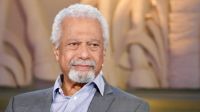The University of the Witwatersrand (Wits) will host the 22nd Nelson Mandela Annual Lecture to be delivered by Abdulrazak Gurnah on September 28th at the Wits Linder Auditorium.
The Nelson Mandela Annual Lecture is celebrated for bringing together global leaders to address and propose solutions to the world’s most pressing challenges. This year’s lecture will explore deep questions on decolonisation and belonging under the theme “Our Shared Humanity.”
It is fitting that the 22nd Nelson Mandela Annual Lecture will be held at Wits University, where Mandela studied during the 1940s as the only Black student in the School of Law at the time. At Wits, Nelson Mandela formed life-changing friendships with activists who fought alongside him against Apartheid, defended him in court, and sacrificed their lives for the freedoms that we enjoy today. While Madiba did not complete his law degree at Wits, In 1990, Wits University awarded Mr Mandela an honorary doctorate and, In 2004, the Wits Mandela Institute was established in the Wits School of Law in his honour.
“Wits University has hosted a number of Nelson Mandela Annual Lectures over the years. We are delighted to partner again with an institution which had a long association with Madiba.” – Verne Harris, Acting Chief Executive of the Nelson Mandela Foundation.
“It is our honour to host the Annual Nelson Mandela Lecture at Wits University. This year’s theme focuses on our common humanity, which aligns closely with the camaraderie that Mr Mandela found at Wits through luminaries such as Ruth First, Joe Slovo, Ahmed Kathrada and many more, back in the 1940s, which was a difficult time for a young Black lawyer at Wits. These associations changed the course of his life, and that of our country forever. Similarly, we hope that the important conversations that emerge from this Lecture, will go a long way towards embracing our shared values, finding common ground, changing and making our world, a better place. “Professor Zeblon Vilakazi, Vice-Chancellor and Principal of Wits University.
Read more about Mandela’s relationship and time at Wits’ research magazine, Curios.ty issue 5, themed MANDELA100.

About Abdulrazak Gurnah
Novelist Abdulrazak Gurnah won the 2021 Nobel Prize in Literature “for his uncompromising and compassionate penetration of the effects of colonialism and the fate of the refugee in the gulf between cultures and continents”.
Gurnah’s writing has explored the immigrant experience.
His first three novels, Memory of Departure (1987), Pilgrims Way (1988) and Dottie (1990), document the immigrant experience in contemporary Britain from different perspectives. His fourth novel, Paradise (1994), is set in colonial East Africa during World War I and was shortlisted for the Booker Prize for Fiction and the Whitbread Book Award (since 2005, the Costa Book Awards). Desertion (2005) was shortlisted for a 2006 Commonwealth Writers’ Prize. His novel By the Sea (2001) was longlisted for the Booker Prize and shortlisted for the Los Angeles Times Book Prize, and another, Afterlives (2020) was shortlisted for the 2021 Orwell Prize for Fictionand longlisted for the Walter Scott Prize for Historical Fiction.
Gurnah was born in 1948 on the island of Zanzibar off the coast of East Africa. He emigrated to the United Kingdom as a student in 1968.
From 1980 to 1983, he lectured at Bayero University in Kano, Nigeria, before taking up a position at the University of Kent.
He was elected a fellow of the Royal Society of Literature in 2006 and he is on the advisory board of the literary magazine Wasafiri.
Gurnah lives in Canterbury, England, where he retired to from the University of Kent, where he was a professor in English and postcolonial literature. He is now an emeritus professor at that university.
About the Nelson Mandela Lecture
The Nelson Mandela Foundation has hosted the Nelson Mandela Lecture since 2003. Previous speakers have included the Nobel Peace laureate Malala Yousafzai; Prime Minister of Barbados, the Honourable Mia Mottley; former Prosecutor of the International Criminal Court, Dr Fatou Bensouda; United Nations Secretary-General, António Guterres; South Africa's Chief Justice Mogoeng Mogoeng; former US president, Barack Obama; the late Archbishop Desmond Tutu; former South African president Thabo Mbeki; Chilean-American author and human rights activist; Ariel Dorfman; Nobel laureate Wangari Maathai; former UN secretary-general Kofi Annan; Liberian President Ellen Johnson Sirleaf; social entrepreneur Muhammad Yunus; Director of Egypt's Library of Alexandria Ismail Serageldin; former Irish president and philanthropist Mary Robinson; philanthropist Mo Ibrahim; Chilean President Michelle Bachelet; economist Thomas Piketty; Microsoft founder and philanthropist Bill Gates; and United Nations deputy secretary-general Amina J Mohammed.